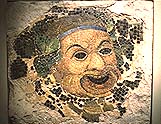

|
||||||||||||||||||
Latin 205: Poenulus
LAT 8-205-1998
Instructor: Cindy Benton, Law Hall 214, x4408
email: cbenton@cornellcollege.edu
Class meetings: M-F 9-11 a.m. and 1-3 p.m.
Office Hours: M W F 11-12 noon and by appointment.
Required Texts:
- Latin Laughs: A Production of Plautus' Poenulus, Student Edition. Bolchazy-Carducci, 1997.
- Latin Laughs: A Production of Plautus' Poenulus, Teacher's Edition. Bolchazy-Carducci, 1997.
Course Goals: This course is designed to help you read Latin with some fluency and to explore several aspects of Roman theater and culture during the Republican period. As part of the project of understanding the mechanisms of Roman theater and the performative nature of Plautine comedy, we will produce a bi-lingual performance of the Poenulus for the campus and local community.
Course Requirements & Grading:
- 10% Class Preparation and Participation:
preparation of Latin reading and other assignments, quizzes, homework,
participation in class discussions and other activities, etc.
- 10% Class Reports: All members of the
technical crew will give a 15-20 minute report during the second week
of block on their area of expertise after reading the appropriate secondary
material. These reports should accomplish two things:
1. Inform the rest of the class about Roman theatrical practice in your area.
2. Propose specific suggestions for the class performance.
Everyone should turn in a one page summary of the material they read and a one page report on the suggestions for the performance.
All members of the cast will give a 15-20 minute presentation on their character after reading an article on the Poenulus or an appropriate aspect of Roman comedy or culture from the selected bibliography (e.g. Roman slavery, prostitution, Rome's relationship with Carthage, the nature of the adulescens in Plautine comedy, etc.) These reports should tie your character study into contemporary issues in Roman culture. Questions to consider: how realistic is Plautus' portrayal of your character? Why might this type of character recur throughout Plautine comedy? Everyone should turn in a one page summary of the article they read and a one page reaction to it.
- 40% Midterm & Final (20% each): Both
exams will include translation, reading comprehension, textual commentary,
and essay questions. Translation and comprehension passages will include
both prepared and sight passages.
- 40% Stage Production: Each person will
participate in some aspect of the class production of a bilingual performance
of the Poenulus to be staged during the 4th week of block for the Cornell
community. Each person's participation will be crucial to the success
of the performance, thus grading will be based on the effort you put
into your role, your constant cooperation with the other members of
the production, and the timeliness with which you accomplish each task
(e.g. learning your lines, finding props, finishing costumes and music
by the deadlines set by the directors). To make it easier for me to
assess your involvement in the play, everyone will keep a log of the
tasks they worked on each day and how much time they spent on each task.
At the end of the course, you will turn this in along with a one or
two page report summarizing what you accomplished, what you wished you
had done but were not able to do, and what you learned from the experience.

Last
Update:April 25, 2000
Site
Maintainer: classical_studies@cornellcollege.edu